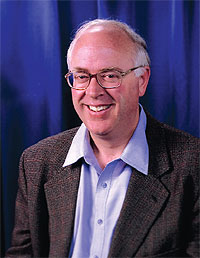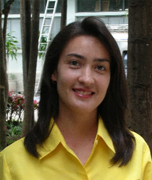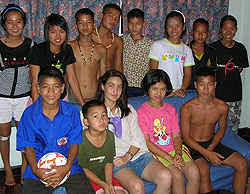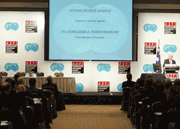Analysis
|
Indonesia’s recent growth performance is better described as respectable rather than impressive. National income accounts released in February estimated the year-on-year growth in GDP to the December quarter of 2006 at 6.1 per cent, a significant increase from the 5.5 per cent growth rate reported for the third quarter. Economics coordinating minister Boediono warned in late 2006, however, that these rates are not sufficient to solve the country’s main economic problems, especially unemployment and poverty. Therefore, the government’s focus in 2007 must be on sustaining a growth rate above the 6 per cent level. Surprisingly, growth was driven mainly by investment in the December quarter — a stark contrast with the previous four quarters. This boost in investment reflects ongoing buoyancy in the construction sector, which accounted for about three quarters of total investment spending. On the other hand, the continued decline of investment in machinery and equipment is a matter for serious concern since it signals little prospect of growth in jobs in the modern sectors, a strong contributor in the past to large reductions in poverty. Moreover, Indonesia’s investment climate remains poor in comparison with its neighbours. A report published by the Japan Bank for International Cooperation in 2006 found that Indonesia’s rank as a promising host for Japanese direct investment (the largest group of investors in Indonesia’s non-oil and gas sectors) in the medium term had declined from fourth in 2002 to ninth in 2006. Firms from China, Singapore and Malaysia are showing more interest in investing in Indonesia. One recent example was an offer by the China Railways Corporation to build a seven-kilometre bridge connecting the islands of Batam and Bintan, with an initial outlay of about $350 million. |
Interest on the part of foreign firms also extends to the acquisition of distressed private companies and banks in Indonesia, as well as to state-owned enterprises. Since early 2006 the Indonesian government has put high priority on reforms to improve the investment climate. By December, 35 out of 85 envisaged measures were reported to have been completed although the draft law on investment had not yet been enacted. That draft includes ‘national treatment’ of foreign investors (putting them on an equal footing with domestic firms); a revised ‘negative list’ (of sectors closed to foreign investment); and streamlined procedures for obtaining investment approvals – all sensitive political issues since anti-foreign business views are held widely among the general public. In addition, the poor quality of the bureaucracy, significant deficiencies in physical infrastructure and other legal insecurity deter foreign investors. Uncertainties about fresh investment in Indonesia are well illustrated in the oil and mining sectors. Now well below Indonesia’s OPEC quota, crude oil production in Indonesia fell from 1.95 per cent of world output in 2000 to 1.4 per cent in 2004. The decline is attributed to the increasing difficulty of extraction as reserves are depleted and to significantly reduced investment in exploration and development after the late 1990s economic crisis. While spending on exploration has recovered considerably there have been no significant discoveries in the western part of the archipelago in the last decade and little exploration yet in eastern Indonesia. Mining operations typically have been highly profitable in recent years, thanks to huge demand from China and India. Yet the climate for new investment is poor. Exploration has been declining over the past decade, because of political instability and regulatory duplication and inconsistency. |
In addition bans on mining in protected forests have been introduced in response to pressure from environmental groups in the new democratic environment, but with little attempt to compare the social benefits of leaving minerals in the ground with those of digging them up. As in so many other areas of the Indonesian economy, action in turning resolve into legal certainty for investors will be an essential component in meeting Boediono's goal of sustaining growth rates of more than six per cent. [Ed. Those other areas: macro-economic trends, the fiscal environment, infrastructure development and poverty reduction are covered in the full survey.] Links:
|

 |
RESEARCHING TERRORISMby Francesca Beddie, Editor, Asian Currents |
| The Australian’s
foreign editor, Greg Sheridan, wrote in a column (http://www.theaustralian.news. What a pity Sheridan did not check his facts before voicing his opinion. Australian academics are studying the terrorist threat. This is a burgeoning field, one being supported by Australian Government research funds and contributing to policy development as well as to international understanding of the contemporary challenges terrorism poses. One of Australia’s leading academics, internationally recognised for his scholarship on international relations and Southeast Asia, addressed the very issues raised by Sheridan at the Terrorism History Conference on 14 June. The conference, held by the Research Network for A Secure Australia, was open to the public. It was attended by scholars, |
security practitioners and public servants from various federal government departments. No journalist was present. Professor Carl Thayer of the Australian Defence Force Academy showed that the study of terrorism had increased 151 percent in the period since 1987 and that more historians, sociologists and anthropologists are becoming involved. But this is not just a numbers game as Thayer made clear, arguing that to view terrorism, especially in Southeast Asia, through an al-Qaeda centric lens, was to fail to understand its roots, its tactics and its likelihood for success. This was why it was so important to have historians, linguists and area specialists working with those who identified themselves as terrorism experts. And that is what we do have in Australia. Take, for example, Dr Greg Fealy, Fellow and Senior Lecturer in Indonesian Politics at the Australian National University. Fealy’s work concentrates on transnational Islamist and neo-revivalist movements in Indonesia, as well as terrorism in Southeast Asia and trends in contemporary Islamic politics. Last year, he co-edited with another eminent scholar, Virginia Hooker, a volume called Voices of Islam in Southeast Asia: A Contemporary Sourcebook. This was no post-modernist, left-wing leaning tome, the sort Sheridan believes is most likely to emanate from Australian universities. The sourcebook was funded by the Department of Foreign Affairs and Trade through the Australian Committee of the Council for Security Cooperation in the Asia Pacific. The Foreign Minister launched it, praising the expertise of all those involved, which has brought to Australian and international audiences the writings of clerics, academics, politicians, journalists, heads of government and ‘lay’ Muslims, as well as rebel leaders and members of terrorist groups, thus giving us some hope of being able to understand the issues that confront us rather than just producing another headline. |
Links:
|

Profile
|
This month we profile, Professor William
Maley, AM, (william.maley@anu.edu.au)
Director of the Asia-Pacific College of Diplomacy at the Australian
National University http://apcd.anu.edu.au |
||
|
Q: What are your current preoccupations?
However, as Director of the Asia-Pacific College of
Diplomacy, I have interests in many different parts of Asia, and in
the second half of 2007 will be involved in running training programmes
in Timor Leste under the auspices of AusAID’s Public Sector Linkages
Program. I also have a longstanding interest in the rise of India as
an Asian power, and try to pay regular visits to India. |
Q: How
do these fit into the contemporary scene? Q: What are your hopes for Asian studies in
Australia? |
|

Student of the month
|
During this time, she has worked for several grassroots non-government organisations that assist the hilltribe people living along the mountainous border area between Burma and Thailand. Her role in these NGOs usually involved translating and proposal writing, as well as training staff in development work. |
Looking for full-time work again, Sumalee started her teaching career and has been teaching primary school for the last three years. In 2006, she also took on the position of director of a hilltribe children's hostel. This led to Sumalee fulfilling a dream to set up her own foundation and hostel. The Ayui Foundation was established in April this year to provide housing and educational and peer support to 11 hilltribe teenagers. Sumalee can be contacted at ayui.foundation@gmail.com if anyone is interested in helping. |

Website of the month
|
Is the host for the Artisanal and Small-Scale Mining (ASM) Asia-Pacific Learning Forum, whose mandate is to promote knowledge about ASM in the region, especially as it applies to poor people’s livelihoods, best practices in environmental care, in policies that work for people as well as for the environment, in creating new approaches that are inclusive, and to promote fellowship and cooperation among those persons and groups interested in poverty eradication and sustainable development. |
Recent article of interest
|
Widening horizons: Australia's new relationship with India
In this paper from the Australian Security Policy Institute, Sandy
Gordon discusses ways in which Australia might develop a more secure
platform for a lasting relationship with India, now a significant
Indian Ocean and Asian power. The executive summary can be found at
http://www.aspi.org.au/publications/executiveSummary.aspx?ContentID=127.
The full paper (hard copy or PDF) can be bought for $20.00. |

Did you know?
| Voyage of Hope: Vietnamese Australian Women's Narratives (Common Ground Publishing, 2005) by ASAA member, Nathalie Huynh Chau Nguyen, was shortlisted for the prestigious 2007 New South Wales Premier's Literary Award. The judges concluded that this is a work of important cultural and social history, containing amazing, often terrifying, life-stories…that never lapse into cultural clichés or sentimentality. http://www.australian.unimelb.edu.au/research/publications/voyageofhope.html |

Diary dates
|
CHINESE STUDIES ASSOCIATION OF AUSTRALIA, 10th Biennial Conference, 27-29 June 2007, Brisbane. Griffith University will be hosting the conference at Southbank in Brisbane. Watch the website for details: http://www.csaa.org.au/news.html THE 2ND ASIAN AUSTRALIAN IDENTITIES CONFERENCE,
28-30 June, Melbourne. The "AAI 2" conference focuses
on the significant momentum of Asian Australian Studies since the inaugural
1999 conference. Invited speakers include filmmakers, academics, politicians,
artists and writers. To register, please visit http://www.asianaustralianstudies.org/ CHINA: EAST ASIA MEDIA/NEW MEDIA CONFERENCE, 5-6 July, Brisbane. With the Beijing Olympics moving closer China is mounting a claim for a leading role in the global and regional cultural economy, drawing on its long tradition as the centre of East Asian culture. Will this be vision ever be achieved? The conference will be hosted by the Australian Research Council Centre of Excellence for Creative Industries and Innovation http://www.cci.edu.au AUSTRALIAN SOCIETY OF INDONESIAN LANGUAGE EDUCATORS (ASILE) Conference, 5-8 July, Caloundra. The 9th ASILE conference at the University of the Sunshine Coast will provide opportunities for Indonesian educators and students to network with one another and hear the latest news on education developments in Australia. Rydges Oasis Resort, Caloundra. See http://intranet.usc.edu.au/wacana/ASILE/index.html
IN SEARCH OF RECONCILIATION AND PEACE IN INDONESIA, workshop 19 and 20 July 2007, Singapore. The Indonesia Study Group, Asia Research Institute, National University of Singapore is holding an interdisciplinary workshop to examine approaches to reconciliation and peace in Indonesia. Its aim is to provide insights into ways forward not only for Indonesia, but for conflict situations much more broadly. http://www.ari.nus.edu.sg or contact the convenor, Dr Birgit Bräuchler aribb@nus.edu.sg. GREAT LEAP FORUM: Asialink Arts Annual Forum 19 July 2007, Brisbane. This is an opportunity for Brisbane arts practitioners to attend a cross-media forum about Australian and Asian arts practice. Specialists from Asia will give examples of their international experience as Australians set the national and local scene. These presentations will be followed by discussions from expert panels articulating challenges and ways forward. 9.00 am - 5.00 pm, Brisbane Powerhouse. For more details contact: a.carroll@asialink.unimelb.edu.au APEC ECONOMIC LEADERS MEETING, 8-9 September, Sydney. The main event of the APEC year brings together the 21 APEC Member Economy leaders, thousands of delegates, support personnel and the international media. See http://www.apec2007.org |
CHINA: CONFERENCE ON MIGRATION AND SOCIAL PROTECTION,
25 to 26 September, Beijing. Monash University's Asian Business
and Economics Research Unit together with the Institute of Population
and Labour Economics at the Chinese Academy of Social Sciences and the
Renmin-Monash Advanced Centre for Economic Studies are staging an international
conference to explore issues such as: labour market integration and
social protection, migrant participation in social security schemes,
migrant alternatives to state-sponsored social protection, migrant working
conditions, salaries and wage arrears, and responsibilities of government
in the provision of social protection. See DESPOTS, DEMOCRATS AND DISCONTENTS: Democratic
Prospects and International Policy Responses in the Middle East and
South Asia, 2 October Sydney. The Sydney Democracy Forum and
the Lowy Institute for International Policy are hosting this event,
with the following speakers: Anthony Bubalo (Lowy Institute for International
Policy), Professor Niraja Gopal Jayal (Jawaharlal Nehru University)
and Professor John Keane (Westminster University/University of Sydney) RSVP: r.mueller@econ.usyd.edu.au by 25 September. SIXTY YEARS OF INDIAN DEMOCRACY: Achievements and Prospects 2 October, Sydney. The Sydney Democracy Forum, with Sydney Ideas, presents a lecture by Professor Niraja Gopal Jayal (Jawaharlal Nehru University) at the Seymour Centre, corner of City Road and Cleveland Street, University of Sydney, 7pm. Bookings are essential: phone (02) 9351 7940. ASPIRE: WATER AND SANITATION IN THE ASIA-PACIFIC
REGION: Opportunities, Challenges and Technology, Perth, 28 October
- 1 November 2007. The Australian Water Association, in conjunction
with the International Water Association is organising this conference,
which will focus on design, operation, maintenance and management of
water and wastewater systems. Innovations in the field, case studies
on safe and reliable systems for removal of nutrients, water reuse,
and methods of better operation will also be discussed at the conference.
There will be specific emphasis on issues facing the Asia-Pacific Region.
Perth Convention & Exhibition Centre. See http://www.awa.asn.au/AM/Template.cfm?Section=ASPIRE_ ASIA PACIFIC REGION: SOCIETIES IN TRANSFORMATION
conference, Georgetown (Penang) Malaysia, 19-22 November, 2007. The
region is seemingly now more integrated, with unprecedented levels of
tourism, migration, and economic and cultural linkages. But, are the
nations of the region, and their populations, more divided, united or
are they fundamentally unchanged over the past two decades? These are
questions to be raised in a conference co-sponsored by the School of
Social Sciences, Universiti Sains Malaysia (USM) and the Centre for
Asia Pacific Social Transformation Studies (CAPSTRANS), University of
Wollongong, Australia The conference website link is at: 17th NEW ZEALAND ASIAN STUDIES SOCIETY (NZASIA) CONFERENCE, Otago, 22-25 November 2007. This will be an open, multidisciplinary conference. Participants are invited to submit panel or paper proposals presenting original research on any Asian-related topic. Proposals for panels are welcome. Paper abstracts, single-spaced and no longer than 200 words, must be submitted before 1 June 2007 to nzasia.conference@stonebow.otago.ac.nz Full conference details can be found at http://www.nzasia.org.nz |

You are welcome to advertise Asia-related events in this space. Send details to: fbeddie@infinite.net.au
Feedback
What would be useful for you? Human interest stories, profiles of successful graduates of Asian studies, more news about what's on, moderated discussions on topical issues? Send your ideas to fbeddie@ozemail.com.au.
About the ASAA
The Asian Studies Association of Australia (ASAA) promotes
the study of Asian languages, societies, cultures, and politics in Australia,
supports teaching and research in Asian studies and works towards an understanding
of Asia in the community at large. It publishes the Asian Studies Review
journal and holds a biennial conference. ASAA and the Centre for Language
Studies at National University of Singapore also co-publish an annual supplementary
issue of the Centre's fully peer-reviewed electronic Foreign Language Teaching
Journal (e-FLT). See http://e-flt.nus.edu.sg
The ASAA believes there is an urgent need to develop a strategy to preserve,
renew and extend Australian expertise about Asia. It has called on the government
to show national leadership in the promotion of Australia’s Asia knowledge
and skills. See Maximizing Australia's Asia Knowledge Repositioning and
Renewal of a National Asset http://coombs.anu.edu.au/SpecialProj/ASAA/asia-knowledge-book-v70.pdf
Asian Currents is published by the Asian Studies Association of Australia (ASAA) http://coombs.anu.edu.au/ASAA/ thanks to a grant from the International Centre of Excellence for Asia Pacific Studies (ICEAPS) http://iceaps.anu.edu.au. It is edited by Francesca Beddie. The editorial board consists of Robert Cribb, ASAA President, Michele Ford, ASAA Secretary, Mina Roces, ASAA Publications officer, Tamara Jacka, ASAA Council member, and Ann Kumar, Director, ICEAPS.



 Q:
When did you become interested in studying Asia and why?
Q:
When did you become interested in studying Asia and why?  With
an Australian diplomat father and Thai mother, Sumalee Milne
had the opportunity to live in many Southeast Asian countries and to
be exposed to different cultures, languages and ways of life while growing
up. It seemed only natural to do a Bachelor of Asian Studies, majoring
in Thai language, at the Australian National University. Upon graduation,
having a desire to return to Southeast Asia and get involved in development
work, Sumalee applied for a posting with Australian Volunteers International
and was sent to Northern Thailand, where she has been living and working
for the last 10 years. Two years ago, she successfully applied for Thai
citizenship.
With
an Australian diplomat father and Thai mother, Sumalee Milne
had the opportunity to live in many Southeast Asian countries and to
be exposed to different cultures, languages and ways of life while growing
up. It seemed only natural to do a Bachelor of Asian Studies, majoring
in Thai language, at the Australian National University. Upon graduation,
having a desire to return to Southeast Asia and get involved in development
work, Sumalee applied for a posting with Australian Volunteers International
and was sent to Northern Thailand, where she has been living and working
for the last 10 years. Two years ago, she successfully applied for Thai
citizenship.  Due
to the demand, she became a freelance translator, mostly for NGOs, and
also interpreted for several documentaries, including ‘Trafficked’,
screened on SBS last year.
Due
to the demand, she became a freelance translator, mostly for NGOs, and
also interpreted for several documentaries, including ‘Trafficked’,
screened on SBS last year. GLOBAL
FORCES 2007 5 - 7 July, Canberra The Australian Security Policy Institute
is holding its 3rd International Conference 'Global Forces'.
The conference will focus on the bigger geopolitical issues shaping
Australia's strategic landscape. Sessions will study the global context
and major influences, security instruments and arrangements, Asia-Pacific
regional and security issues, and consider Australian policy responses.
Hyatt Hotel, Commonwealth Avenue, Yarralumla, ACT 2600 See
GLOBAL
FORCES 2007 5 - 7 July, Canberra The Australian Security Policy Institute
is holding its 3rd International Conference 'Global Forces'.
The conference will focus on the bigger geopolitical issues shaping
Australia's strategic landscape. Sessions will study the global context
and major influences, security instruments and arrangements, Asia-Pacific
regional and security issues, and consider Australian policy responses.
Hyatt Hotel, Commonwealth Avenue, Yarralumla, ACT 2600 See